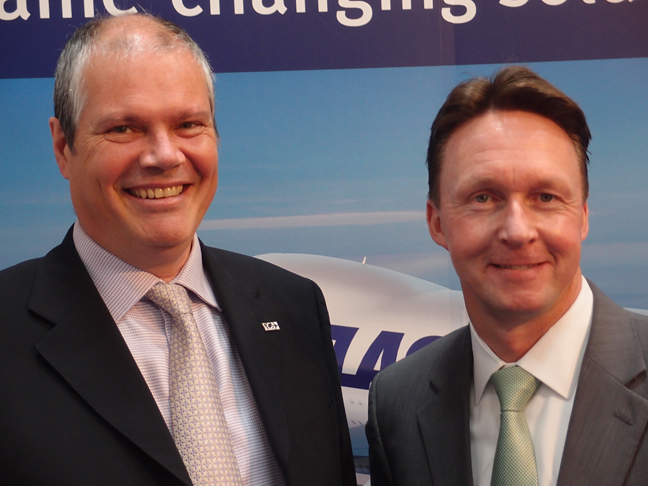Evans And Steen
Will Change Air Cargo

Throughout
history there are many outstanding combinations that have gone on to
achieve great things.
In that regard, Anthony & Cleopatra
loved and destroyed; Stanley & Livingston explored and discovered,
Hillary and Tenzing climbed and reach new heights, and Don Quixote and
Sancho Panza proved that windmills could be conquered.
Even peas and carrots seem to work well
together.
Which brings us to an interesting and
new combination dynamic in air cargo: Evans & Steen.
Right now both are on the board of directors
at The International Air Cargo Association (TIACA) and if their vision
and energy level is any indication, these two could be driving change
for the better as TIACA gets new leadership and maybe even a new lease
on life.
Michael Steen is Executive Vice President
and Chief Commercial Officer at Atlas Air, the biggest, most important
ACMI operator on the planet.
Oliver Evans is the chief cargo officer
of Swiss World Cargo and a frequent knowledgeable voice for ACN
FT.
On any given day, either one of these
leaders could fill a reporter’s notebook with volumes about their
own dynamic businesses.
This day, both took up the sword for a
better-organized air cargo industry.
We caught up with the dynamic duo at Air
Cargo Europe and it was upbeat, with indications of some innovative
and inventive things to come.
Building TIACA seems a cornerstone of
both Evans’ & Steen’s extracurricular activity, but
both take nothing for granted.
MS: “Timing
is critical.
“While the industry has been begging
for a platform to be developed for quite some time, now we have come
to that point with TIACA being the administrative structure to the Global
Air Cargo Advisory Group (GACAG).
“TIACA is really helping to pull
the group together around important subjects such as security, customs
and freight facilitation and lastly also the image of the air cargo
industry itself.
“The truth is that air cargo is
a leading trendsetter, if you look at global trade and the world economy.
“We think air cargo has a lot to
do as an industry to get our message across.
“TIACA has done much in the past
couple of years to transform itself from just setting up trade shows
(and effective shows at that) to becoming a global voice on various
panels and committees for air cargo.
“Today, with a strong new board
including Oliver Evans who joins us as new TIACA vice-chairman, we expect
to develop our global impact as an organization even more.”
OE: “The
air cargo industry is maturing-and these are words that I use with great
purpose.
“We have all seen great entrepreneurs
driving companies forward; Michael Chowdry building Atlas for example,
and others, but now we realize that there is only so far that we can
go within our own sphere of influence, within our own company, partners,
customers and suppliers.
“For example, when an ash cloud
from a volcano in Iceland sets off various governments in Europe on
separate courses as to what to regulate, and other actions that impact
air cargo, they need guidance and some help. Indications we are getting
are that they would welcome some expert input.
“People question TSA, but the fact
remains that TSA is reaching out to the industry so air cargo has to
be a better partner all around.
“TIACA and the unfortunately titled
GACAC (Global Air Cargo Advisory Group) formed last year at TIACA AMS
can bring better understanding and cooperation between air cargo and
governments and agencies around the world.”
MS: “TIACA
has representative membership from every aspect of the air cargo business,
including integrators, airports, freight forwarders and airlines, plus
representation from the entire complex supply chain that makes the industry
go.
“What we have done at TIACA is to
create sub-committees amongst our membership with each led by a TIACA
board member charged with addressing various issues.
“Reception from governments and
officials charged with oversight and regulation has been just fantastic."
You sit and listen to these air cargo
executives and can only wonder what has taken air cargo so long to get
this kind of wake up call.
Thinking back to the opening here, Evans
& Steen could be Don Quixote & Sancho Panza although we would
not want to ascribe which role either would assume or if either, even
on their worse day, could be considered to be leading a charge against
windmills, real or imagined.
Still, these two executives find themselves
in 2011 putting much of their well-deserved reputations on the line
in a sincere attempt to institute change for air cargo, and brothers
and sisters, that kind of lofty goal is no cakewalk.
MS: “We
are not doing this alone. The step change has come from TIACA aligning
itself and joining forces with IATA and FIATA and also from an industry
showing real signs that it understands collaboration is the way forward
and that with cooperation and better understanding everyone will benefit.
“We don’t set the rules nor
do we impose them. What we want to do is help drive the development
with regulators so that when some new rules come into play everyone
has been heard and the way forward benefits the industry.
“The hope is that we have finally
got the platform here that can drive real change.
“Membership interest in joining
TIACA has risen tremendously since the Amsterdam ACF last November—an
indication that our initiatives toward change are gaining traction.”
OE: “As
an industry, we need to be more self-critical as well.
“Our world is quite complex, with
airlines & forwarders, handlers, truckers, brokers you name it involved
in the selling and routing of air cargo.
“The regulation that we have to
deal with – acts of God like weather and volcanoes that befall
our business, acts of terror, etc., add up to huge complexities that
we all have to deal with in our business.
“But there is a way to simplify
communication and clear lines between all aspects of our business.
“It is both an opportunity and our
responsibility to get things right in the future.
“I think we will see momentum in
all aspects of our business because of the steps that we are taking.
“In a session at Air Cargo Europe
someone wondered who is going to pay for all the expensive security
and other procedures required to move air cargo today and in the future.
“The simple answer is you and me,
so we need to make sure that our procedures and systems are top quality,
streamlined and focused through close collaboration between every aspect
of the industry and regulators.”
Finally, we wonder about GACAG.
The wunder organization with a name that
could also be a town in Finland, or perhaps the sound of a baby eagle
asking for more ground-up worm, has gotten lots of buzz.
We wonder, with all the other things the
duo need worry about, how did a group with the simple mission of getting
people to work together come to such a tongue-twister of a name with
letters that don’t even seem to work together?
MS: “Everything
we do is evolutionary. Now as the World Customs Organization and others
are showing some interest in joining our effort, I think eventually
as the structure of GACAG changes that could have an effect on the name.”
We also wonder, in this world that is
so hell-bent on instant gratification and results, what goals have been
set for GACAG and when can air cargo expect to feel the impact of the
new organization?
FT: “You
guys are in a honeymoon period, as we say-When can we see some results?”
OE: “I
think you will see some results in a very short period of time.
“And why do I say that?
“It’s because right now as
the U.S. and other countries draw closer toward recognizing each others
security requirements, GACAG is already playing a key role.”
MS: “I
think we have seen positive results already; for example, at the last
CNS Partnership we heard a presentation mentioning GACAC as a road map
toward the future.
“I think that is a result in itself
– recognizing GACAC as a template for the future whilst saying
let’s all get onboard and build our future together.
“Look, as an industry we have been
so incredibly fragmented through the years and were never really pulling
in the same direction.
“This is a complex industry with
many issues and many decision makers from all over the world with opinions
and special needs.
“There will be noted successes with
GACAC. Helping to implement IATA, e-freight will feel its impact, but
this is a long-term commitment to work toward bettering transportation
on a global scale.”
Questions about TIACA ACF 2012 in Atlanta,
Georgia get a firm and supportive answer from Michael Steen.
MS: “We
are very excited about ACF 2012 in Atlanta.
“There are great companies based
in Atlanta, such as Delta Airlines, Home Depot, Coca Cola and others,
and they will be involved in the Air Cargo Forum.
“TIACA feels that a very high level
of participation of company leaders in Atlanta 2012 will set the stage
for what air cargo needs to build its global business.
“TIACA will also work to drive up
the image of air cargo at the ACF 2012 event.”
And as for the challenge of DOJ activity,
wherein fear of security and fuel price-fixing indictments might impact
attendance of this USA event?
MS: “We
expect no major impact or loss of attendance at ACF 2012 because of
DOJ activity.
“Attendance set a record in Amsterdam.
“Atlanta will be substantially better
– that’s the view right now.”
Geoffrey/Flossie
|



![]() 100%
Green
100%
Green